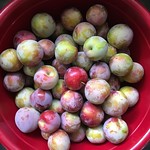Chive
Herbs share a few properties. One of them being that they can be bought and used fresh, dried at home from fresh or bought dried. Nutrient quantities can vary wildly based on which of those categories of herbs you’re consuming. Unfortunately, nutrition data is usually not available for fresh herbs.
One thing to consider is that herbs are usually consumed in quantities that make it so you’re more interested in the various polyphenols, alkaloids, terpenes etc - many of which exhibit promising health benefits - than you are vitamin, mineral or macro content as it applies to your broader diet.
The alliums share a few properties: They all have edible bulbs and greens. They are foundational to many dishes and cuisines, especially slowly simmered stews and braises. And they have hypothesized health benefits due to unique organosulfurs and flavonoids, especially quercetin.
Highlights
- The typical serving size for Chive is very small, so while it may be rich in some nutrients, we can't consider it a good or exceptional source.
 eat a plum
eat a plum